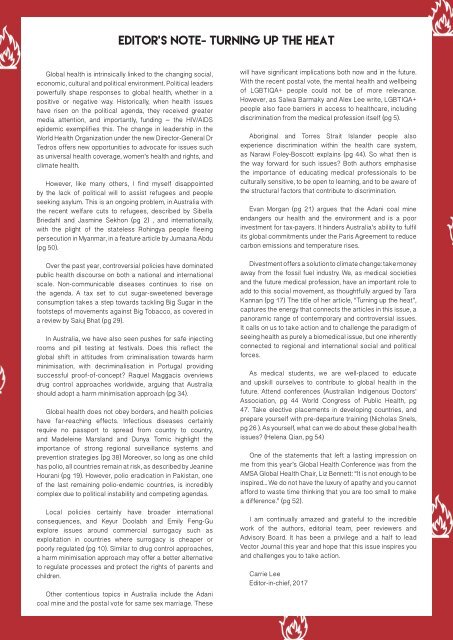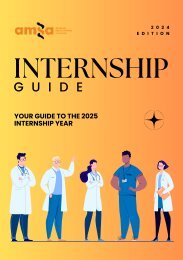Vector Volume 11 Issue 2 - 2017
Create successful ePaper yourself
Turn your PDF publications into a flip-book with our unique Google optimized e-Paper software.
Editor’s Note- Turning up the heat<br />
Global health is intrinsically linked to the changing social,<br />
economic, cultural and political environment. Political leaders<br />
powerfully shape responses to global health, whether in a<br />
positive or negative way. Historically, when health issues<br />
have risen on the political agenda, they received greater<br />
media attention, and importantly, funding – the HIV/AIDS<br />
epidemic exemplifies this. The change in leadership in the<br />
World Health Organization under the new Director-General Dr<br />
Tedros offers new opportunities to advocate for issues such<br />
as universal health coverage, women’s health and rights, and<br />
climate health.<br />
However, like many others, I find myself disappointed<br />
by the lack of political will to assist refugees and people<br />
seeking asylum. This is an ongoing problem, in Australia with<br />
the recent welfare cuts to refugees, described by Sibella<br />
Briedahl and Jasmine Sekhon (pg 2) , and internationally,<br />
with the plight of the stateless Rohingya people fleeing<br />
persecution in Myanmar, in a feature article by Jumaana Abdu<br />
(pg 50).<br />
Over the past year, controversial policies have dominated<br />
public health discourse on both a national and international<br />
scale. Non-communicable diseases continues to rise on<br />
the agenda. A tax set to cut sugar-sweetened beverage<br />
consumption takes a step towards tackling Big Sugar in the<br />
footsteps of movements against Big Tobacco, as covered in<br />
a review by Saiuj Bhat (pg 29).<br />
In Australia, we have also seen pushes for safe injecting<br />
rooms and pill testing at festivals. Does this reflect the<br />
global shift in attitudes from criminalisation towards harm<br />
minimisation, with decriminalisation in Portugal providing<br />
successful proof-of-concept? Raquel Maggacis overviews<br />
drug control approaches worldwide, arguing that Australia<br />
should adopt a harm minimisation approach (pg 34).<br />
Global health does not obey borders, and health policies<br />
have far-reaching effects. Infectious diseases certainly<br />
require no passport to spread from country to country,<br />
and Madeleine Marsland and Dunya Tomic highlight the<br />
importance of strong regional surveillance systems and<br />
prevention strategies (pg 38) Moreover, so long as one child<br />
has polio, all countries remain at risk, as described by Jeanine<br />
Hourani (pg 19). However, polio eradication in Pakistan, one<br />
of the last remaining polio-endemic countries, is incredibly<br />
complex due to political instability and competing agendas.<br />
Local policies certainly have broader international<br />
consequences, and Keyur Doolabh and Emily Feng-Gu<br />
explore issues around commercial surrogacy such as<br />
exploitation in countries where surrogacy is cheaper or<br />
poorly regulated (pg 10). Similar to drug control approaches,<br />
a harm minimisation approach may offer a better alternative<br />
to regulate processes and protect the rights of parents and<br />
children.<br />
Other contentious topics in Australia include the Adani<br />
coal mine and the postal vote for same sex marriage. These<br />
will have significant implications both now and in the future.<br />
With the recent postal vote, the mental health and wellbeing<br />
of LGBTIQA+ people could not be of more relevance.<br />
However, as Salwa Barmaky and Alex Lee write, LGBTIQA+<br />
people also face barriers in access to healthcare, including<br />
discrimination from the medical profession itself (pg 5).<br />
Aboriginal and Torres Strait Islander people also<br />
experience discrimination within the health care system,<br />
as Narawi Foley-Boscott explains (pg 44). So what then is<br />
the way forward for such issues? Both authors emphasise<br />
the importance of educating medical professionals to be<br />
culturally sensitive, to be open to learning, and to be aware of<br />
the structural factors that contribute to discrimination.<br />
Evan Morgan (pg 21) argues that the Adani coal mine<br />
endangers our health and the environment and is a poor<br />
investment for tax-payers. It hinders Australia’s ability to fulfil<br />
its global commitments under the Paris Agreement to reduce<br />
carbon emissions and temperature rises.<br />
Divestment offers a solution to climate change: take money<br />
away from the fossil fuel industry. We, as medical societies<br />
and the future medical profession, have an important role to<br />
add to this social movement, as thoughtfully argued by Tara<br />
Kannan (pg 17) The title of her article, “Turning up the heat”,<br />
captures the energy that connects the articles in this issue, a<br />
panoramic range of contemporary and controversial issues.<br />
It calls on us to take action and to challenge the paradigm of<br />
seeing health as purely a biomedical issue, but one inherently<br />
connected to regional and international social and political<br />
forces.<br />
As medical students, we are well-placed to educate<br />
and upskill ourselves to contribute to global health in the<br />
future. Attend conferences (Australian Indigenous Doctors’<br />
Association, pg 44 World Congress of Public Health, pg<br />
47. Take elective placements in developing countries, and<br />
prepare yourself with pre-departure training (Nicholas Snels,<br />
pg 26 ). As yourself, what can we do about these global health<br />
issues? (Helena Qian, pg 54)<br />
One of the statements that left a lasting impression on<br />
me from this year’s Global Health Conference was from the<br />
AMSA Global Health Chair, Liz Bennett: “It is not enough to be<br />
inspired... We do not have the luxury of apathy and you cannot<br />
afford to waste time thinking that you are too small to make<br />
a difference.” (pg 52).<br />
I am continually amazed and grateful to the incredible<br />
work of the authors, editorial team, peer reviewers and<br />
Advisory Board. It has been a privilege and a half to lead<br />
<strong>Vector</strong> Journal this year and hope that this issue inspires you<br />
and challenges you to take action.<br />
Carrie Lee<br />
Editor-in-chief, <strong>2017</strong><br />
1

















